初中英语形容词和副词课件
- 格式:ppt
- 大小:1.15 MB
- 文档页数:54
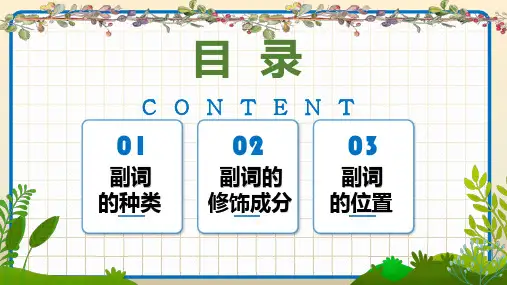
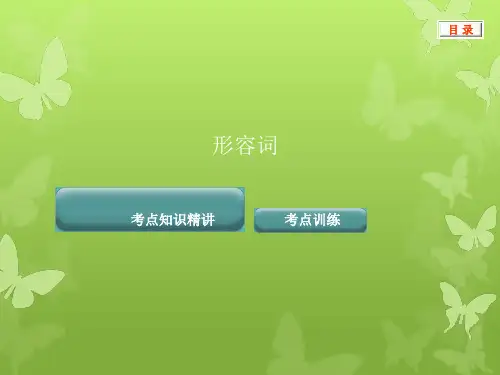
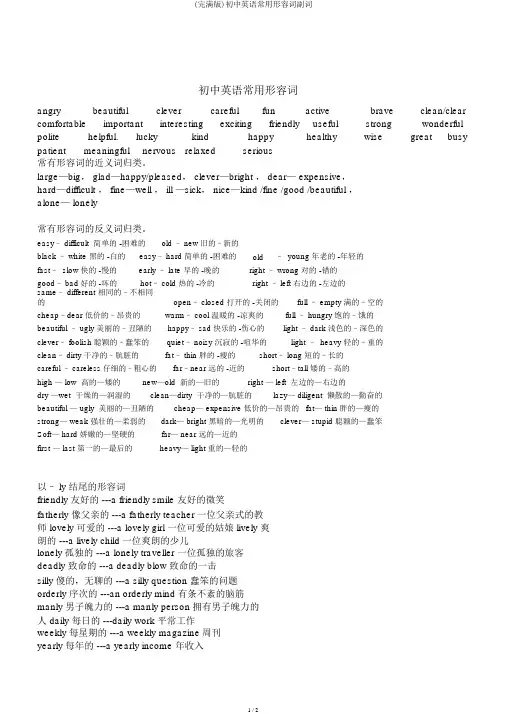
初中英语常用形容词angry beautiful clever careful fun active brave clean/clear comfortable important interesting exciting friendly useful strong wonderful polite helpful.lucky kind happy healthy wise great busy patient meaningful nervous relaxed serious常有形容词的近义词归类。
large—big, glad—happy/pleased, clever—bright , dear— expensive,hard—difficult , fine—well , ill —sick, nice—kind /fine /good /beautiful ,alone— lonely常有形容词的反义词归类。
easy– difficult 简单的 -困难的old – new 旧的–新的black – white 黑的 -白的easy– hard 简单的 -困难的old– young 年老的 -年轻的fast– slow 快的 -慢的early – late 早的 -晚的right – wrong 对的 -错的good– bad 好的 -坏的hot– cold 热的 -冷的right – left 右边的 -左边的same– different 相同的–不相同的open– closed 打开的 -关闭的full – empty 满的–空的cheap–dear 低价的–昂贵的warm– cool 温暖的 -凉爽的full – hungry 饱的–饿的beautiful – ugly 美丽的–丑陋的happy– sad 快乐的 -伤心的light – dark 浅色的–深色的clever– foolish 聪颖的–蠢笨的quiet– noisy 沉寂的 -喧华的light – heavy 轻的–重的clean– dirty 干净的–肮脏的fat– thin 胖的 -瘦的short– long 短的–长的careful – careless 仔细的–粗心的far–near 远的 -近的short–tall 矮的–高的high — low 高的—矮的new—old 新的—旧的right — left 左边的—右边的dry —wet 干燥的—润湿的clean—dirty 干净的—肮脏的lazy— diligent 懒散的—勤奋的beautiful — ugly 美丽的—丑陋的cheap— expensive 低价的—昂贵的 fat— thin 胖的—瘦的strong— weak 强壮的—柔弱的dark— bright 黑暗的—光明的clever— stupid 聪颖的—蠢笨Soft— hard 娇嫩的—坚硬的far— near 远的—近的first — last 第一的—最后的heavy— light 重的—轻的以– ly 结尾的形容词friendly 友好的 ---a friendly smile 友好的微笑fatherly 像父亲的 ---a fatherly teacher一位父亲式的教师 lovely 可爱的 ---a lovely girl 一位可爱的姑娘 lively 爽朗的 ---a lively child 一位爽朗的少儿lonely 孤独的 ---a lonely traveller 一位孤独的旅客deadly 致命的 ---a deadly blow 致命的一击silly 傻的,无聊的 ---a silly question 蠢笨的问题orderly 序次的 ---an orderly mind 有条不紊的脑筋manly 男子魄力的 ---a manly person 拥有男子魄力的人 daily 每日的 ---daily work 平常工作weekly 每星期的 ---a weekly magazine周刊yearly 每年的 ---a yearly income 年收入副词的分类副词按词汇意义可分为:方式副词: well , fast,slowly , carefully , quickly程度副词: very , much, enough, almost, rather, quite地点副词: here, there, out, somewhere, abroad, home哪些单词既是形容词又是副词初中常有的有 :fast, hard, enough, early, late,t,high,far方式副词:well (好地)fast(快地 )carefully(小心地 )quickly (快地)sadly(伤心地)badly (严重地,特别)carelessly(粗心地)slowly (慢慢地)politelyproperly (合适地,完满地)(有礼貌地)proudly (骄傲地),successfully (成功地)happily (快乐地)angrily (生气地,气愤地)。
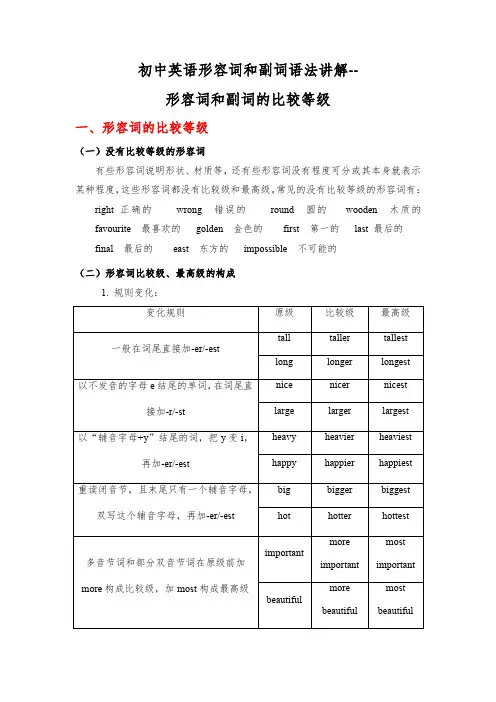
初中英语形容词和副词语法讲解--形容词和副词的比较等级一、形容词的比较等级(一)没有比较等级的形容词有些形容词说明形状、材质等,还有些形容词没有程度可分或其本身就表示某种程度,这些形容词都没有比较级和最高级。
常见的没有比较等级的形容词有:right 正确的wrong 错误的round 圆的wooden 木质的favourite 最喜欢的golden 金色的first 第一的last 最后的final 最后的east 东方的impossible 不可能的(二)形容词比较级、最高级的构成1. 规则变化:变化规则原级比较级最高级一般在词尾直接加-er/-esttall taller tallestlong longer longest以不发音的字母e结尾的单词,在词尾直接加-r/-st nice nicer nicest large larger largest以“辅音字母+y”结尾的词,把y变i,再加-er/-est heavy heavier heaviest happy happier happiest重读闭音节,且末尾只有一个辅音字母,双写这个辅音字母,再加-er/-est big bigger biggest hot hotter hottest多音节词和部分双音节词在原级前加more构成比较级,加most构成最高级importantmoreimportantmostimportant beautifulmorebeautifulmostbeautiful2.不规则变化:原级比较级最高级good/well better bestbad/ill worse worstmany/much more mostlittle less leastold older/elder oldest/eldestfar farther/further farthest/furthest(三)形容词比较等级的用法1.原级的用法(1)肯定句中用“as+原级形容词+as”表示双方在程度、特征等方面相同。
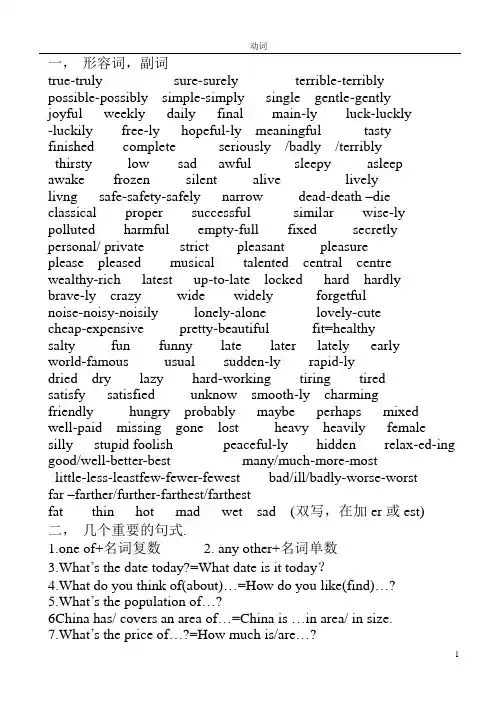
一,形容词,副词true-truly sure-surely terrible-terriblypossible-possibly simple-simply single gentle-gentlyjoyful weekly daily final main-ly luck-luckly-luckily free-ly hopeful-ly meaningful tastyfinished complete seriously /badly /terriblythirsty low sad awful sleepy asleepawake frozen silent alive livelylivng safe-safety-safely narrow dead-death –die classical proper successful similar wise-ly polluted harmful empty-full fixed secretly personal/ private strict pleasant pleasureplease pleased musical talented central centrewealthy-rich latest up-to-late locked hard hardlybrave-ly crazy wide widely forgetfulnoise-noisy-noisily lonely-alone lovely-cutecheap-expensive pretty-beautiful fit=healthysalty fun funny late later lately earlyworld-famous usual sudden-ly rapid-lydried dry lazy hard-working tiring tiredsatisfy satisfied unknow smooth-ly charmingfriendly hungry probably maybe perhaps mixedwell-paid missing gone lost heavy heavily female silly stupid foolish peaceful-ly hidden relax-ed-ing good/well-better-best many/much-more-mostlittle-less-leastfew-fewer-fewest bad/ill/badly-worse-worstfar –farther/further-farthest/farthestfat thin hot mad wet sad (双写,在加er或est) 二,几个重要的句式.1.one of+名词复数2. any other+名词单数3.What’s the date today?=What date is it today?4.What do you think of(about)…=How do you like(find)…?5.What’s the population of…?6China has/ covers an area of…=China is …in area/ in size.7.What’s the price of…?=How much is/are…?=How much do/does …cost?8.What’s the weather like today?=How is the weather?9.What day is it today?10.How are you?=How are you doing?11. can’t be too+adj.12.What’s the weight of..?=How much do/does …weigh?13.What do you think makes him so clever?14. so/such… that15.How much do you know about …?=How well do you know…?16.Which is the way to…? Can you tell me which is the way to the zoo?17.I wonder what is wrong with her.18. the key to the door the answers to the questions19.appear take place happen 不可用被动语态,主动语态表被动意义。

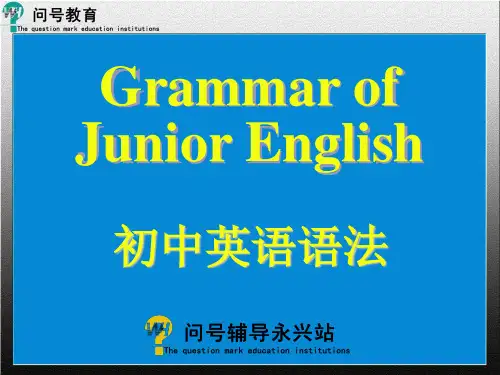

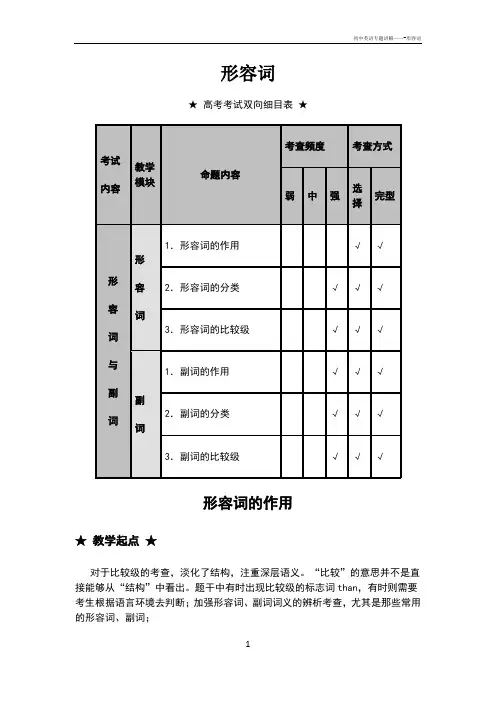
形容词★高考考试双向细目表★形容词的作用★教学起点★对于比较级的考查,淡化了结构,注重深层语义。
“比较”的意思并不是直接能够从“结构”中看出。
题干中有时出现比较级的标志词than,有时则需要考生根据语言环境去判断;加强形容词、副词词义的辨析考查,尤其是那些常用的形容词、副词;★互动研学★1. 形容词作表语The Summer Palace is very beautiful.颐和园非常美丽。
2. 形容词作宾语补足语We found the text very difficult. 我们觉得这篇课文很难。
You should keep your class room clean. 你们应该保持教室清洁。
3. 形容词相当于副词,作状语We arrived at home very late,sate and sound.我们到家很晚,安然无恙。
He came home,dead tired. 他回到家来,累得要死。
4. 形容词作定语This is beautiful rose. 这是二朵美丽的玫瑰花。
Let me tell you something interesting.我来告诉你一些有趣的事。
注意:(一)形容词作定语的位置(1)修饰something,anything,everything,nothing,everyone, anybody等复合不定代词时要后置。
如: Is there anything important in the article?这篇文章里有什么重要的东西吗There is something difficult in the lesson.这堂课里有些东西很难。
(2)形容词后面有介词短语或不定式短语时,要后置。
如: He is a worker worthy of praise.他是一个值得表扬的工人。
It is a problem difficult to solve.这是一个难于解决的问题。
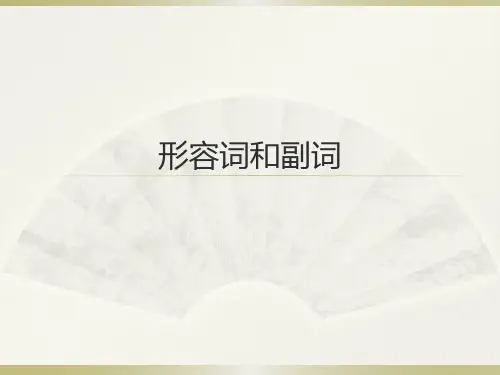
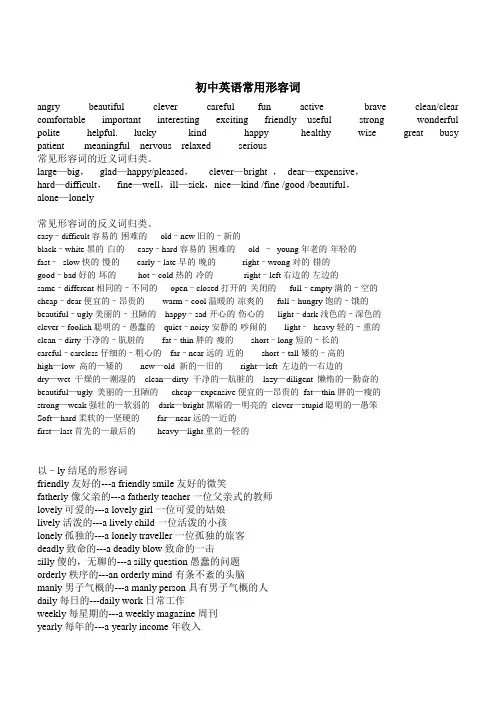
初中英语常用形容词angry beautiful clever careful fun active brave clean/clear comfortable important interesting exciting friendly useful strong wonderful polite helpful. lucky kind happy healthy wise great busy patient meaningful nervous relaxed serious常见形容词的近义词归类。
large—big,glad—happy/pleased,clever—bright ,dear—expensive,hard—difficult,fine—well,ill—sick,nice—kind /fine /good /beautiful,alone—lonely常见形容词的反义词归类。
easy–difficult容易的-困难的old–new旧的–新的black–white黑的-白的easy–hard容易的-困难的old –young年老的-年轻的fast–slow快的-慢的early–late早的-晚的right–wrong对的-错的good–bad好的-坏的hot–cold热的-冷的right–left右边的-左边的same–different相同的–不同的open–closed打开的-关闭的full–empty满的–空的cheap–dear便宜的–昂贵的warm–cool温暖的-凉爽的full–hungry饱的–饿的beautiful–ugly美丽的–丑陋的happy–sad开心的-伤心的light–dark浅色的–深色的clever–foolish聪明的–愚蠢的quiet–noisy安静的-吵闹的light–heavy轻的–重的clean–dirty干净的–肮脏的fat–thin胖的-瘦的short–long短的–长的careful–careless仔细的–粗心的far–near远的-近的short–tall矮的–高的high—low 高的—矮的new—old 新的—旧的right—left 左边的—右边的dry—wet 干燥的—潮湿的clean—dirty 干净的—肮脏的lazy—diligent 懒惰的—勤奋的beautiful—ugly 美丽的—丑陋的cheap—expensive便宜的—昂贵的fat—thin胖的—瘦的strong—weak强壮的—软弱的dark—bright黑暗的—明亮的clever—stupid聪明的—愚笨Soft—hard柔软的—坚硬的far—near远的—近的first—last首先的—最后的heavy—light重的—轻的以–ly结尾的形容词friendly友好的---a friendly smile友好的微笑fatherly像父亲的---a fatherly teacher一位父亲式的教师lovely可爱的---a lovely girl一位可爱的姑娘lively活泼的---a lively child一位活泼的小孩lonely孤独的---a lonely traveller一位孤独的旅客deadly致命的---a deadly blow致命的一击silly傻的,无聊的---a silly question愚蠢的问题orderly秩序的---an orderly mind有条不紊的头脑manly男子气概的---a manly person具有男子气概的人daily每日的---daily work日常工作weekly每星期的---a weekly magazine周刊yearly每年的---a yearly income年收入副词的分类副词按词汇意义可分为:方式副词:well,fast,slowly,carefully,quickly程度副词:very,much,enough,almost,rather,quite地点副词:here,there,out,somewhere,abroad,home哪些单词既是形容词又是副词初中常见的有:fast, hard, enough, early, late,t,high,far方式副词:well(好地) fast(快地) carefully(小心地) quickly(快地)sadly(伤心地)badly(严重地,非常)slowly(慢慢地)politely(有礼貌地)proudly(骄傲地),carelessly(粗心地)properly(适当地,完全地)successfully(成功地)happily(高兴地)angrily(生气地,愤怒地)。
初中英语语法 --- 形容词和副词用法讲解命题趋势:形容词的比较级是近几年中考命题的热点之一,占中考题的百分之九以上,近几年中考试题主要观察形容词在句中作表语,后置定语和宾语补足语的用法。
比较级的一些不规律的情况及一些固定句型也特别重要,比较级和最高等在特定的语言环境中的采纳也是重点观察内容。
考点一、形容词的定义及句法功能形容词是用来描述或修饰名词(或代词)的一类词。
形容词在句中主要用作定语、表语和宾语补足语。
1.用作定语,修饰名词或代词。
(1)形容词修饰名词时,一般置于它所修饰的名词从前;如有若干形容词同时修饰一个名词时,它们的排列序次较为固定,平时为:描述形容词—特色形容词 -- (包括大小、长短、形状、新旧、年纪等) -- 颜色形容词。
比方: She has beautiful long curly blond hair.她长着漂亮的金黄色长卷发。
Mary gave me a useful big brown wooden box.玛丽给我一个合用的大的褐色木盒子。
注意:A.enough 修饰名词时,既可以放在名词从前,也可以放在名词此后。
但多放在名词前。
比方:Don’ t worry, we have enough time/time enough to get there.别焦虑,我们有足够的时间赶到那处。
B.由连字符连接起来的复合形容词中的名词只能用单数形式。
比方:an eight-year-old boy一个8岁的男孩(2)形容词修饰由 some,any,every,no 等构成的复合不定代词时,需后置。
比方:Will you please tell us something interesting?你给我们说一些幽默的事好吗?There ’ s nothing special in the box.盒子里没有什么特其余东西。
Anyone intelligent can do it.任何有智力的人都能做这件事。